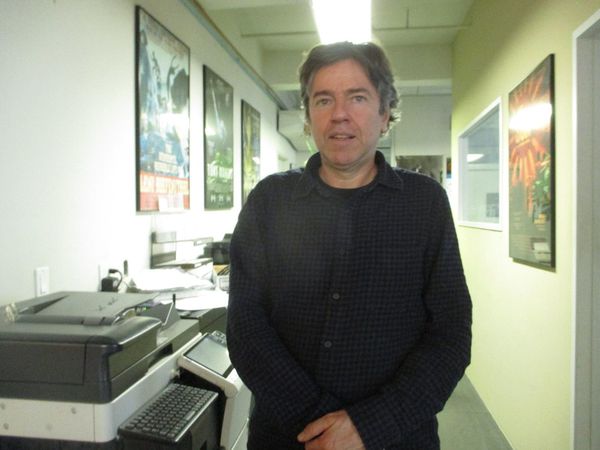 |
| Andres Veiel on contacting Eva Beuys: "I had Eugen Blume, the head of Hamburger Bahnhof, who curated the show of Joseph Beuys. He's a friend who really helped me a lot." Photo: Anne-Katrin Titze |
In the final installment of my conversation with Andres Veiel at Kino Lorber in midtown Manhattan, the director of Beuys gave me a fairy tale reference to explain what it took to make a film on Joseph Beuys - with or without the inclusion of his artworks. Beuys includes interviews with Caroline Tisdall, Rhea Thönges-Stringaris, Klaus Staeck, Johannes Stüttgen, and Franz Joseph van der Grinten, shot by Jörg Jeshel and was smartly edited with Stephan Krumbiegel and Olaf Voigtländer. The documentary includes archival footage of a playful Andy Warhol and begins and ends beautifully with clips from Lutz Mommartz' Soziale Plastik.
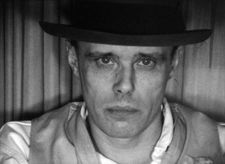 |
| On the filming of Joseph Beuys by Lutz Mommartz in Soziale Plastik: "The camera is the spectator, the anonymous spectator." |
Anne-Katrin Titze: Your film was four years in the making. Did it take a lot of effort on your part to get permission for all the footage?
Andres Veiel: We had to deal with a lot of restrictions. We had to get permission first of all from the estate. And it was not easy.
AKT: From his wife and children?
AV: Yes. It was like in a fairy tale. You know these fairy tales when you want to marry the princess and you have to solve several riddles? And if you fail you get - how do you say?
AKT: Decapitated? Wow. What were those riddles?
AV: It's funny. I knew there were a lot of directors [who tried]. I know at least from three directors who failed.
AKT: Of course there always have to be the other princes who failed.
AV: I started with a concept. I had good advice. I had Eugen Blume, the head of Hamburger Bahnhof, who curated the show of Joseph Beuys. He's a friend who really helped me a lot. And he helped me to write this letter to the widow [Eva Beuys]. And no response. Then I called her after two weeks. And she said: "Ah, that's you. I see." She was like a teacher. "In your concept three titles were wrong. And if you start with flaws and mistakes in the very beginning - we don't need a film, I tell you frankly. Thank you for making the effort." And I just heard the busy line and that's it.
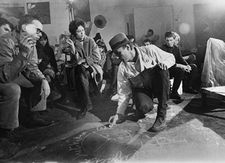 |
| Joseph Beuys creates and teaches: "We ended with what you called the circle, with a Beuys who is still strong, vivid, full of humor and a twinkle in his eye." |
I called again and I said "I sent you another film of mine. Of course I start from scratch, of course there are mistakes. I don't pretend that I'm a specialist on Beuys but I have my own necessity to do the film. And if you see the other film you'll get an idea why I have to make a film on your husband."
And then I sent a DVD of Blackbox Germany. It's a film about German terrorists of the RAF and a victim. Anyway, she got the film and I got a letter three days later. I opened it and expected a no. But it was a white page and there was a huge YES. That was it. Somehow it was a miracle.
AKT: You convinced the princess.
AV: I solved the riddle. It was not the end, of course. We had a roller coaster ride sometimes.
AKT: To get access to the archives?
AV: You have to have the permission of the estate to use art in the film. His pieces of art. No permission, no use of the art. We had a second crisis in the middle of the process. Suddenly she refused to sign the contract and her lawyer called the producer and everything was stopped. I already had worked for a year and a half on the project. It was a catastrophe. I decided I will make a film at any rate on Beuys. I will make a film without any pieces of art.
AKT: And you told her so?
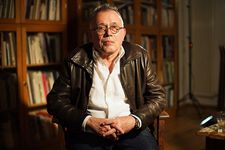 |
| Johannes Stüttgen, chairman from 1980 - 1986 of the Free International University co-founded by Beuys Photo: Jörg Jeshel |
AV: I went to Eva Beuys and told her I'll do a film at any rate, "You can't stop it." I had some sort of self-esteem. I was not afraid. There's way A or way B. I thought maybe the film without art is more like the hare.
AKT: How old was she at the time?
AV: 80-something already. And then she signed. I had 80 pages with pieces of art listed.
AKT: Did she say no to some of them?
AV: No.
AKT: Yes to everything?
AV: It was very interesting. It was too much. I helped her, I gave her the pen and here were 80 pages and she wanted to get rid of it and so she signed.
AKT: You show her and the children in one shot.
AV: Yeah, twice in a photo. She was not willing to show up in the film. Of course it was not easy for her to watch the film in the very end but she accepted it and came to the premiere in Berlin.
!["He [Joseph Beuys] was really at the end of everything because he didn't get the money for the 7000 Oaks."](/images/newsite/Joseph Beuys 3_225.jpg) |
| "He [Joseph Beuys] was really at the end of everything because he didn't get the money for the 7000 Oaks." |
AKT: You mentioned how it all started with the phone call. I love how you use the phone ringing. How it punctuates the entire film. Phone ringing non-stop in all the different archival footage. As if you were just looking for ringing phones and him picking up, saying "Beuys?" It speaks of the 'Verschleiß' - the working up.
AV: Verschleiß, yeah. It was really a thing. When people tell me about his life, it's really Verschleiß all the time. He very rarely refused a phone call. He never thought, well, this guy is more important than this guy because he is a gallerist, he can help me have an exhibition at MoMA. No. He talked to everybody and so he answered the phone no matter what.
AKT: You begin your documentary with a question and you end with the same footage, right?
AV: It's like a circle.
AKT: Where was it from?
AV: It was shot I think in the early Seventies. Lutz Mommartz did it. Lutz was a very extreme director in terms of … He put a camera up and he left the room. Because Beuys was alone, the camera is the spectator, the anonymous spectator. And that's why he speaks directly into the camera. That's why it has that strange direct intensity. It's an interesting point - the question of the circle. We had a huge problem in editing.
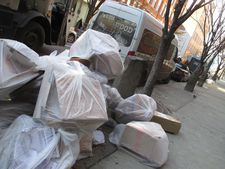 |
| 7000 Oaks in New York City with recycling waiting to be picked up by sanitation. Photo: Anne-Katrin Titze |
AKT: You had a different ending?
AV: We had a fantastic ending, even in the rough cut. We ended with Beuys in Japan. He was really at the end of everything because he didn't get the money for the 7000 Oaks.
AKT: He did a Japanese whiskey commercial to raise money?
AV: He did the whiskey commercial, he was kicked out of the Green Party and you see the last image was in the airport of Tokyo. For some reason Beuys was alone and it was shot from above, a total shot, wide open space. Beuys had some sort of heavy, loaded baggage and he was old and bent and you felt death. An image of somebody who failed, who was close to death and alone. A very lonely image.
And we shot the last work he did in Naples, Palazzo Regale. It's like remnants of a grave with a shell, his coat. It was like the gifts for a king for the grave. People saw this image of the old man lost in the airport and people cried. We ended with a failure. Death was like a failure. It was a guy from New York, It's funny, and he watched the rough cut, and he said "It's so German what you do!"
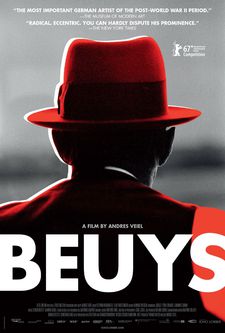 |
| Beuys US poster: "You have to have the permission of the estate to use art in the film." |
I said "Why is it German? People cried, people are touched." He said "We in the US, we would make him a hero. Beuys is a hero and we would never let him fail in the end. We would celebrate him. And you Germans you have to build somebody up and then you have to push him." And I thought of this guy in the end. I was shocked and I felt he is right.
AKT: You had the beginning.
AV: We had the beginning. It took finding a new structure. And we ended with what you called the circle, with a Beuys who is still strong, vivid, full of humour and a twinkle in his eye. That was the solution.
AKT: And the questions.
AV: And the questions, yes. That was the crucial point for me, to end with the notion - it's a common work. It's something like an offer for us who are still alive. To end with this battery, the offer of a common work.
AKT: I am happy that you did it this way and didn't use the German ending.
Read what Andres Veiel had to say on the performances and nature of Joseph Beuys, his criticism of the art market, what the artist was up against in Germany, and Beuys' relationship to wildlife documentarian Heinz Sielmann.
Beuys has now been held over for an extended run of three weeks at Film Forum in New York through February 22.





















